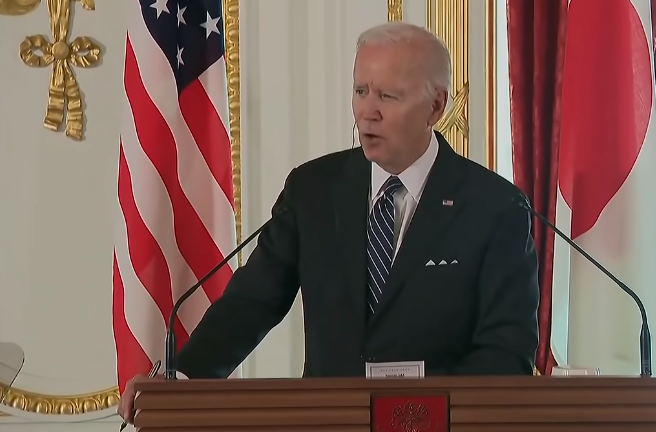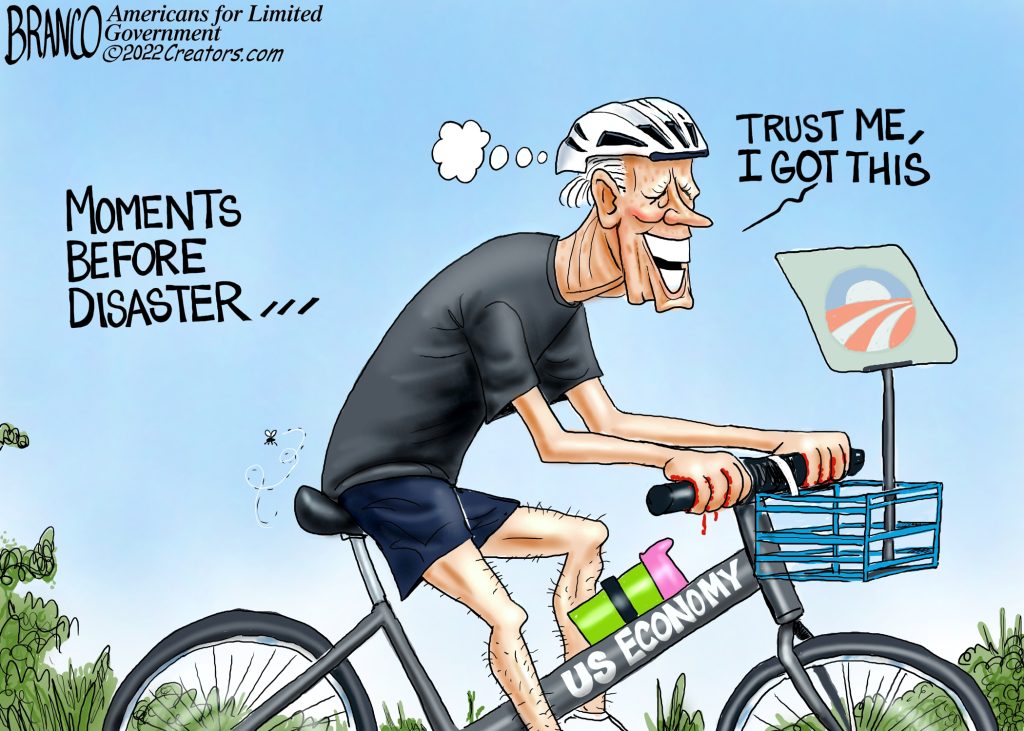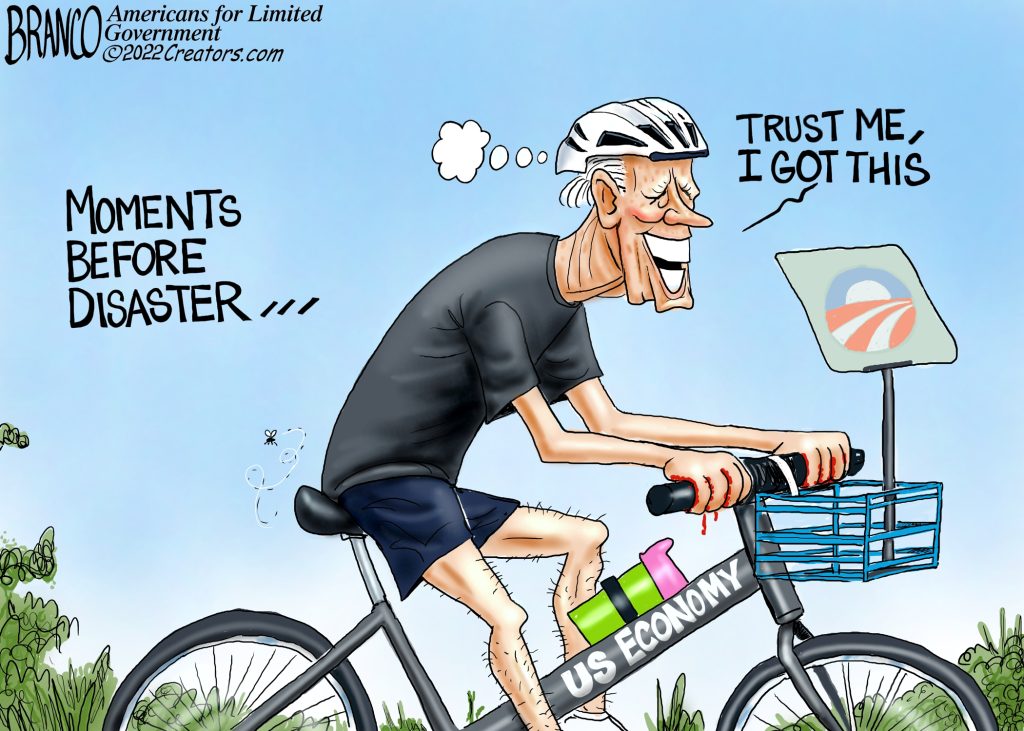July 20, 2022
Permission to republish original opeds and cartoons granted.
Happy Talk: The Biden White House is still clinging to hope there is no recession. We’ll find out July 28.

By Robert Romano
“It is very hard to conclude that we are in a recession when you look at the payroll and the job gains that we've seen now, it is tricky to look around the corner here, and I'm not going to predict quarters down the road. But I think right now, you’ve got inflation headwinds big time in this economy – not taking anything away from that – but you also have some very strong tailwinds that are boosting consumers."
That was White House Council on Economic Advisors member Jared Bernstein offering his take on the state of the economy on Fox News Sunday with Shannon Bream, that while inflation was “unacceptably high” — and at 9.1 percent consumer inflation and 11.3 percent producer inflation, there is little question — it might still not be enough to tip the U.S. into a recession. Somehow.
Bernstein’s analysis definitely mirrors what has been the White House position for several months ago, with President Joe Biden telling the Associated Press in June that a recession was “not inevitable”: “First of all, it's not inevitable. Secondly, we're in a stronger position than any nation in the world to overcome this inflation.”
But is it just a tired talking point? We’ll find out on July 28 when the Bureau of Economic Analysis (BEA) offers its first glimpse at the second quarter Gross Domestic Product (GDP). The first quarter already showed an inflation-adjusted decline of real GDP by 1.6 percent. Two quarters of negative growth in a row is typically considered to be a recession.
Note that is an inflation-adjusted number. It’s very important, because in the first quarter nominal GDP actually increased by 6.6 percent. It’s just that prices of goods and services increased faster than the measured increase in spending.
The American people certainly think we’re already in a recession, with the latest Economist-YouGov poll showing 58 percent of Americans believe the economy is shrinking. That includes 59 percent of men, 57 percent of women, 51 percent of blacks, 59 percent of Hispanics, majorities of every age demographic, every income bracket, every region, 60 percent of independents, 74 percent of Republicans, and even 42 percent of Democrats.
Only 34 percent of Democrats, the most die-hard, think we’re not in a recession and perhaps believe Biden that the economy is somehow strong enough to overcome inflation.
But there are lots of reasons to doubt that.
The spread between 10-year and 2-year treasuries, a reliable recession indicator that has predicted almost every recession in modern economic history, inverted for the third time this year on July 5. This followed inversions overnight on June 13 and on March 31.
315,000 jobs were lost in the Bureau of Labor Statistics’ household survey in June, the second month this year experiencing losses after 353,000 jobs were similarly lost in April.
And leaving little doubt, the Atlanta Federal Reserve’s GDPNow indicator is forecasting a 1.6 percent inflation-adjusted drop in the second quarter of 2022.
On July 28, when the BEA presents the latest GDP readings, it could turn out that when Biden was saying a recession was “not inevitable,” we already were in one. On one hand, everyone expects the President to be the cheerleader for the American economy, but when reality comes raining down, won’t Biden and his advisors appear to have been out of touch this whole time? Stay tuned.
Robert Romano is the Vice President of Public Policy at Americans for Limited Government Foundation.
To view online: https://dailytorch.com/2022/07/happy-talk-the-biden-white-house-is-still-clinging-to-hope-there-is-no-recession-well-find-out-july-28/
Cartoon: Sleepy Rider
By A.F. Branco

Click here for a higher level resolution version.
To view online: https://dailytorch.com/2022/06/cartoon-sleepy-rider/


Market Research Foundation: The divide between the middle class and elites is only widening amidst economic woes
The divide between the middle class and elites is only widening as skyrocketing inflation, higher gas prices, and a tepid economic recovery push economic issues front and center.
Last week, Market Research Foundation noted close to two-thirds of voters say their number one issue is something directly related to the rising cost of living. The latest Monmouth University poll shows a full third of voters (33%) say inflation is their number one issue, followed by gas prices (15%), the economy overall (9%), and paying for bills and groceries (6%).
This translates to 63% of Americans saying they are most concerned with immediate economic issues, over any number of distant political narratives peddled by the ruling elites.
Now polling from the New York Times/Siena College shows wealthy white liberals are significantly more likely to prioritize social issues like abortion and gun control, while working class whites and minorities are focused on tangible economic issues. A focus on the economy is also closely linked to preference for a GOP-controlled Congress this fall.
The pollsters found those who say the economy is their number one issue prefer Republican control of Congress 62% to 25%. The Times was careful to point out voters who are economically motivated skew less affluent and are more likely to be nonwhite than voters who prioritize social issues.
These economically motivated voters are not necessarily conservative on social issues. For example, more than half of the voters who said the economy was their biggest concern also said abortion should be mostly legal.
As the Times points out, the Democratic party is continuing to drive away minorities and the middle-class, drawing its support mostly from wealthy white liberals.
“For the first time in a Times/Siena national survey, Democrats had a larger share of support among white college graduates than among nonwhite voters — a striking indication of the shifting balance of political energy in the Democratic coalition”, writes the Times. “As recently as the 2016 congressional elections, Democrats won more than 70 percent of nonwhite voters while losing among white college graduates.”
But even still, the share of Americans who prioritize abortion or gun control is slim. The Times points out that only about one in six registered voters combined say either gun issues or abortion is the most important problem facing the country. Those who do prioritize gun control or abortion prefer Democratic control of Congress, 68 percent to 8 percent.
The Times also shows only 74% percent of Democrats who supported Biden in 2020 and prioritize the economy now say they want a Democratic controlled Congress. In other words, as many as a quarter economically driven Biden voters do not want the Democratic Party in charge anymore.
To view online: https://marketresearchfoundation.org/2022/07/19/the-divide-between-the-middle-class-and-elites-is-only-widening-amidst-economic-woes/


